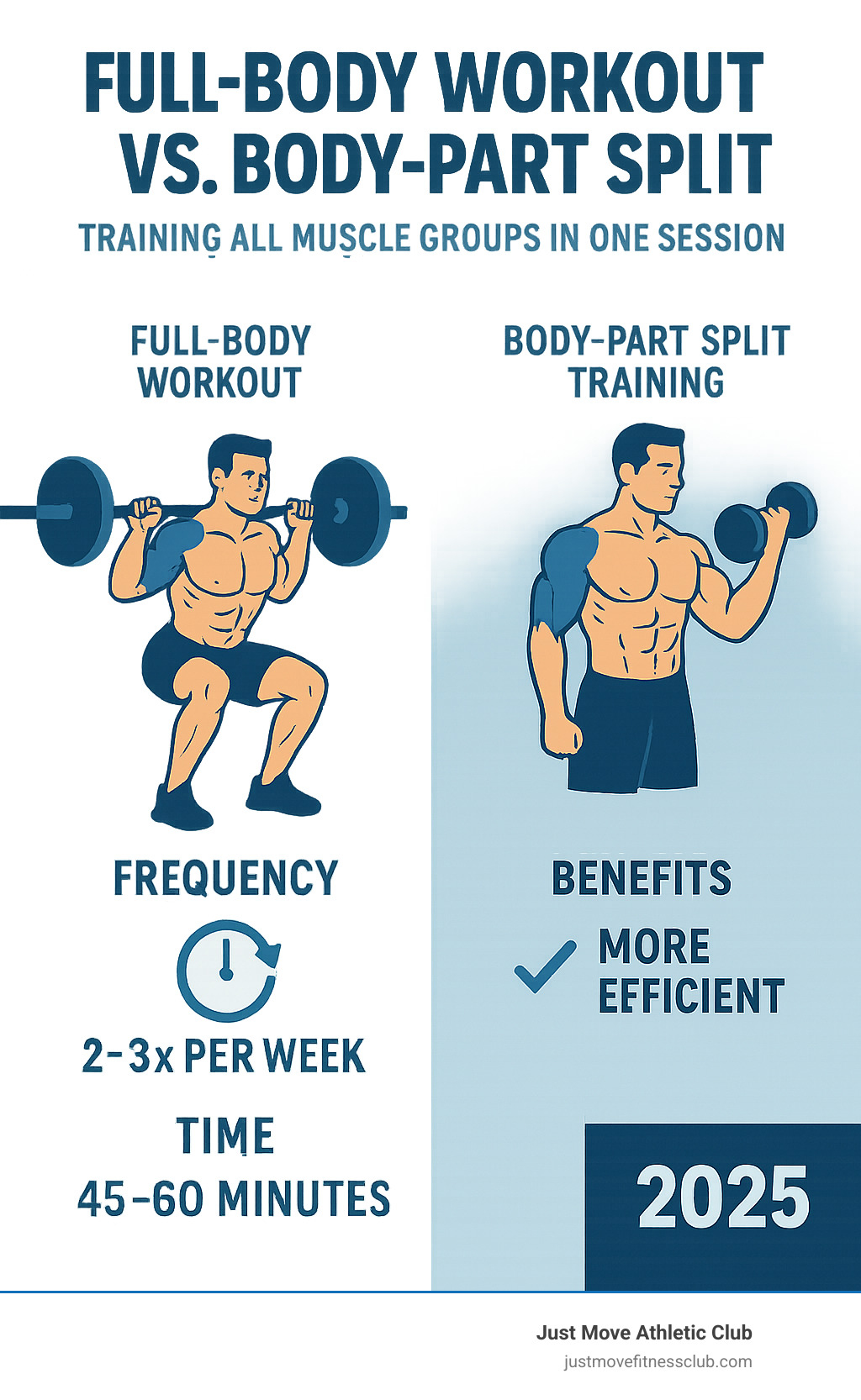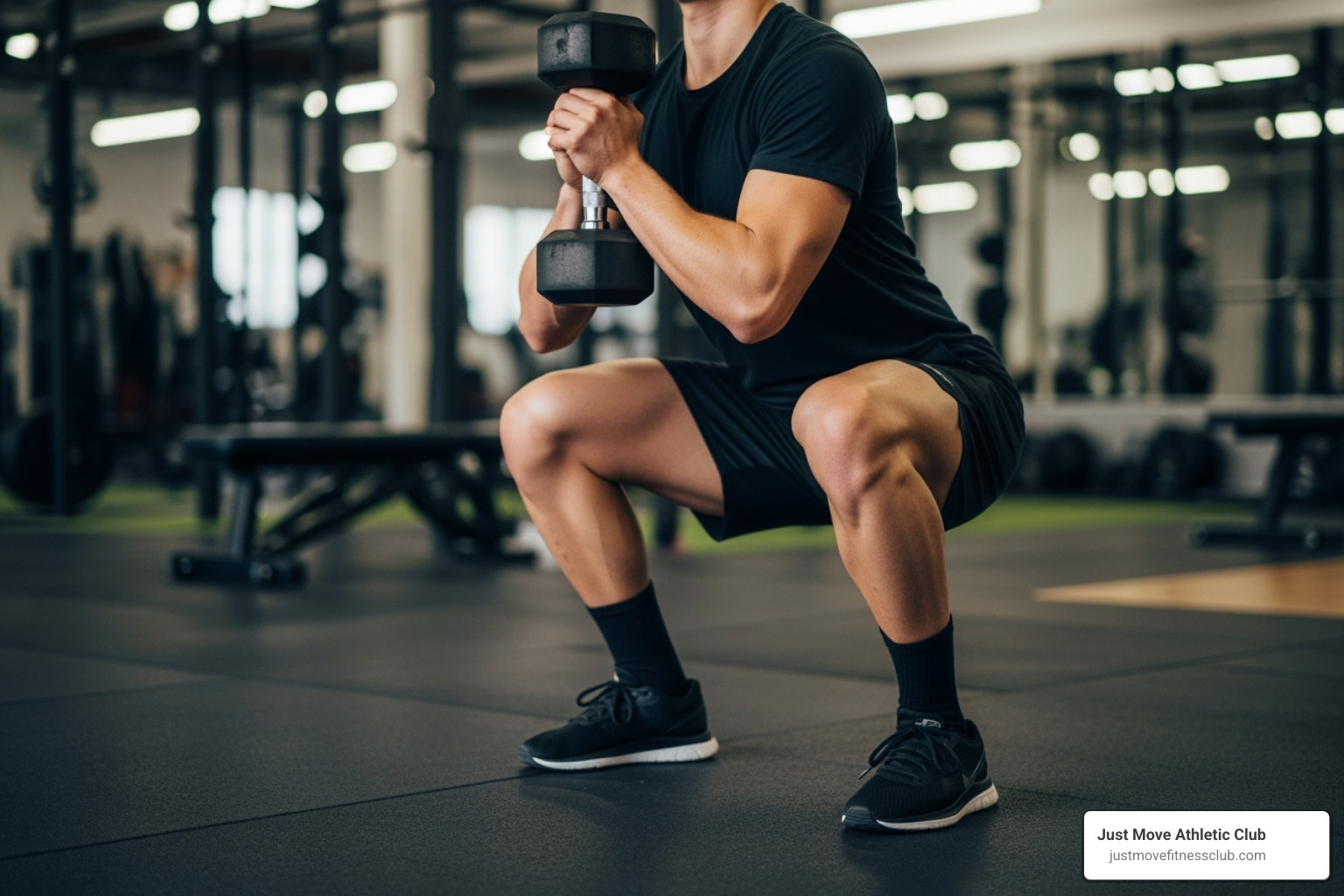Why Full-Body Workouts Are Your Best Investment for Building Muscle and Strength
A full body workout routine muscle and strength program trains all major muscle groups in a single session, making it one of the most proven and efficient approaches to fitness. Here’s what makes it so effective:
Key Benefits:
- Time-efficient – Train your entire body in 45-60 minutes
- Higher frequency – Hit each muscle 2-3 times per week vs. once with splits
- Beginner-friendly – Simple structure with compound movements
- Flexible scheduling – Perfect for busy lifestyles with just 3 days per week
- Better recovery – Lower volume per session reduces overuse injury risk
Best For:
- Beginners building foundational strength
- Busy adults with limited gym time
- Anyone wanting balanced muscle development
- People returning to fitness after a break
Whether you’re new to strength training or looking to maximize your results with limited time, full-body workouts deliver impressive gains in both muscle size and strength. Research shows that training each muscle group 2-3 times per week produces superior results compared to the traditional once-per-week approach used in body part splits.
The beauty of full-body training lies in its simplicity and effectiveness. By focusing on compound movements like squats, deadlifts, and presses, you’ll work multiple muscle groups simultaneously while building functional strength that translates to everyday activities.
As Pleasant Lewis JMAC, founder of Just Move Athletic Clubs with over 40 years in the fitness industry, I’ve seen how a well-designed full body workout routine muscle and strength program transforms lives by creating sustainable, results-driven habits that fit into any schedule. Through decades of helping members achieve their goals, I’ve refined these principles to maximize both efficiency and effectiveness.

Common full body workout routine muscle and strength vocab:
What is a Full-Body Workout and Why Choose It?
A full body workout routine muscle and strength program is an all-in-one fitness solution where you train every major muscle group in each workout. Unlike splits that focus on one or two body parts per session (like upper/lower, push/pull/legs, or a “chest day”), a full-body routine trains everything at once.
While traditional body-part splits often train a muscle only once per week, research suggests this lower frequency is less than ideal for maximizing growth. So why choose full-body training?
Time efficiency is a major benefit. You can get a complete, effective workout in just 45-90 minutes. Scheduling is also flexible. With only 2-4 workouts needed per week, it’s easy to adjust if you miss a day without skipping an entire muscle group for the week.
A key advantage is higher training frequency. Scientific research on training frequency and muscle growth shows that training muscles multiple times per week yields superior results. After a workout, muscle protein synthesis (the building process) is liftd for 24-48 hours. Training the full body 2-3 times per week keeps this process engaged more often, leading to more growth opportunities.
Compound exercises like squats, deadlifts, and presses are the core of full-body training. They work multiple muscle groups at once, making them incredibly efficient for building functional strength that helps in everyday life.
For beginners, a 3-day program is ideal. It provides frequent practice to master form and accelerates initial strength gains. The simplicity is effective: no complex schedules, just consistent progress toward your goals.
The Ultimate Full Body Workout Routine for Muscle and Strength
To build muscle and strength, you must apply progressive overload: gradually challenging your muscles more over time. This can mean adding more weight, reps, or sets, or simply improving your form. The goal is to avoid stagnation.
For sets and reps, lower reps (5-8) with heavier weight build raw strength, while higher reps (8-12) with moderate weight are better for muscle growth. For rest periods, take 2-3 minutes for heavy compound lifts and 60-90 seconds for lighter accessory work to ensure proper recovery and intensity.
Our workout structure is simple: start with a warm-up, perform the big compound movements first, and then finish with accessory exercises.

Foundational Compound Exercises for Total Body Growth
These multi-joint movements give you the most bang for your buck, providing maximum muscle recruitment.
- Squats: The king of exercises, squats build your quads, glutes, hamstrings, and core. Barbell, front, or goblet squats are all excellent for lower body strength.
- Deadlifts: Perhaps the most complete exercise, deadlifts target the entire posterior chain (hamstrings, glutes, back) and build immense total-body strength.
- Bench Press: A classic for upper body pushing power, the bench press develops the chest, front shoulders, and triceps.
- Overhead Press: This builds strong shoulders and triceps while engaging your core for stability.
- Rows: Rows (barbell, dumbbell, or cable) are crucial for a strong back and biceps, providing balance to pressing movements.
- Pull-ups: Pull-ups or lat pulldowns develop back width and biceps. Lat pulldowns are a great alternative if you’re building up to pull-ups.
The Classic 3-Day Full Body Workout Routine for Muscle and Strength
A 3-day full-body split is ideal for most, especially beginners. Training on non-consecutive days (e.g., Mon/Wed/Fri) allows for optimal recovery. Using an A/B workout structure (Week 1: A-B-A, Week 2: B-A-B) provides variety and ensures all muscles are targeted effectively. Consistency is more important than having a “perfect” routine.
Workout A:
- Barbell Squats: 3 sets of 5-8 reps
- Incline Dumbbell Press: 3 sets of 8-12 reps
- Bent-Over Barbell Rows: 3 sets of 8-12 reps
- Overhead Dumbbell Press: 3 sets of 8-12 reps
- Romanian Deadlifts: 3 sets of 10-15 reps
- Plank: 3 sets, hold for 30-60 seconds
Workout B:
- Deadlifts: 3 sets of 3-5 reps
- Barbell Bench Press: 3 sets of 5-8 reps
- Lat Pulldowns or Pull-ups: 3 sets of 8-12 reps
- Leg Press or Goblet Squats: 3 sets of 10-15 reps
- Dumbbell Bicep Curls: 3 sets of 10-15 reps
- Overhead Triceps Extensions: 3 sets of 10-15 reps
- Standing Calf Raises: 3 sets of 15-20 reps
Always start with a 5-10 minute dynamic warm-up and finish with some light stretching.
Structuring 2-Day and 4-Day Splits
- 2-Day Split: For those short on time, alternating Workouts A and B twice a week still hits each muscle group twice, which is great for maintenance and progress.
- 4-Day Split: While possible for advanced lifters, a 4-day full-body split can lead to excessive fatigue and potential overuse injuries. More is not always better. Research suggests that training each muscle group twice weekly is highly effective for intermediates, which a 3-day routine accomplishes perfectly.
Tailoring Your Full-Body Routine: Special Considerations
A full body workout routine muscle and strength program is adaptable, but it should be custom to your age, experience, and goals. Think of it as a base recipe you adjust to your personal needs.

For Beginners: Building Your Foundation
For beginners, a full-body routine is ideal. Your top priority is learning proper form. Start with light weights to master movements and build a strong mind-muscle connection, which is crucial for avoiding overexertion and preventing injury. You’ll experience rapid initial strength gains (“newbie gains”) as your body adapts. The frequent practice from a 3-day routine accelerates this progress. Consistency beats intensity; showing up regularly is more important than one overly intense session.
For Intermediate/Advanced Lifters: Is It Still Optimal?
Yes, full-body routines can work for advanced lifters, but there are challenges. As you get stronger, you need more training volume to progress. Fitting this into a single session becomes difficult, leading to long workouts, systemic fatigue, and reduced performance on later exercises. While effective for maintenance or general fitness, other splits may be more optimal for maximizing muscle growth at an advanced level.
For Lifters Over 40: Training Smart and Safe
Resistance training is crucial over 40 to combat age-related muscle and bone loss. A full-body routine is excellent with a few smart adjustments.
- Use joint-friendly modifications: Swap barbell squats for goblet squats or leg presses if needed. Dumbbells can be a great alternative to barbells for presses. At Just Move Athletic Club, our trainers can help you find the right alternatives.
- Prioritize recovery: You may need an extra rest day. Listen to your body; muscle soreness is normal, but sharp pain is a signal to stop.
- Focus on form and control: Use perfect technique and controlled movements to maximize stimulus and prevent injury.
- Never skip your warm-up and cool-down: Properly preparing your muscles and joints is non-negotiable.
Fueling Your Gains: Nutrition for a Full-Body Program
A great full body workout routine muscle and strength program requires proper nutrition to deliver results. What you eat fuels recovery and growth, but it doesn’t have to be complicated.
Getting Your Calories Right
To build muscle, eat in a slight caloric surplus (200-500 calories over maintenance). For strength without size, aim for caloric maintenance. Our Fit3D Pro Body Scanner at Just Move Athletic Club can help you determine your metabolic needs.
The Big Three: Macronutrients That Matter
- Protein is essential for muscle repair. Aim for 0.7-1.0 grams per pound of body weight daily, spread out with 25-40 grams per meal.
- Carbohydrates fuel your workouts. Focus on complex carbs like oats, sweet potatoes, and brown rice for sustained energy.
- Healthy Fats from sources like avocados, nuts, and olive oil are vital for hormone production, which aids muscle growth.
Hydration: The Often-Forgotten Game Changer
Hydration is critical for performance and nutrient transport. Even slight dehydration can hurt your workout. Drink water consistently throughout the day.
Timing Your Fuel
Nutrient timing can help. Eat a meal of carbs and protein 1-2 hours pre-workout for energy. Have a similar meal post-workout to aid recovery. However, your total daily intake is more important than precise timing.
Supporting your full body workout routine muscle and strength program with solid nutrition means you’ll feel the difference: better energy, faster recovery, and steady progress.
Frequently Asked Questions about Full-Body Workouts
Here are answers to common questions about starting a full body workout routine muscle and strength program.
How many days a week should I do a full-body workout?
For most people, 3 days per week on non-consecutive days (e.g., Monday, Wednesday, Friday) is ideal. This frequency is proven to be highly effective for growth as it stimulates muscles multiple times per week while allowing for crucial recovery. Training every day is not recommended, as muscles grow during rest.
Can you build significant muscle with only full-body workouts?
Absolutely. Full-body workouts are very effective for building muscle, especially for beginners and intermediates. They rely on compound movements and high-frequency training, a proven recipe for growth. When combined with progressive overload and proper nutrition, you can achieve impressive muscle gains.
Should I do cardio on my rest days?
Yes, light to moderate cardio like walking or easy cycling on rest days can be beneficial. It aids recovery by increasing blood flow. Avoid high-intensity cardio if your primary goal is muscle gain, as it can interfere with recovery. If fat loss is also a goal, moderate cardio is a great addition. At Just Move Athletic Club, we can help you find the perfect balance between your strength and cardio work to support your specific goals.
Conclusion: Start Building Your Best Body Today
The full body workout routine muscle and strength approach isn’t just another fitness trend—it’s a proven, time-tested method that delivers real results. Throughout this guide, we’ve explored how this training style offers an unbeatable combination of efficiency, effectiveness, and versatility that fits into virtually any lifestyle.
Whether you’re a complete beginner learning your first squat or an experienced lifter looking to streamline your training, full-body workouts provide everything you need. The beauty lies in their simplicity: compound movements that work multiple muscle groups, higher training frequency that maximizes growth, and flexible scheduling that adapts to your busy life.
But here’s the truth that matters most: consistency and progressive overload are crucial for results. It’s not about having the perfect workout or the most complex routine. It’s about showing up regularly, gradually challenging yourself, and staying committed to the process. The best workout program is the one you’ll actually stick to.
At Just Move Athletic Club, we understand that every fitness journey is unique. That’s why we focus on creating custom fitness experiences custom to your specific needs and goals. Our state-of-the-art facilities across Lakeland, North Lakeland, South Lakeland, Winter Haven, and Havendale provide the perfect environment to put these full-body principles into action.
We are committed to tracking real progress, and our Fit3D Pro Body Scanner takes the guesswork out of your fitness journey by providing precise measurements of muscle growth, fat loss, and body composition changes. This technology helps you see exactly how your full body workout routine muscle and strength program is changing your body, keeping you motivated and on track.
Ready to transform your physique, build serious strength, and accept a healthier lifestyle? Your journey starts with a single decision to take action.
Join Just Move Athletic Club to get a personalized fitness plan and start your journey. Let’s work together to build your best body—starting today!
